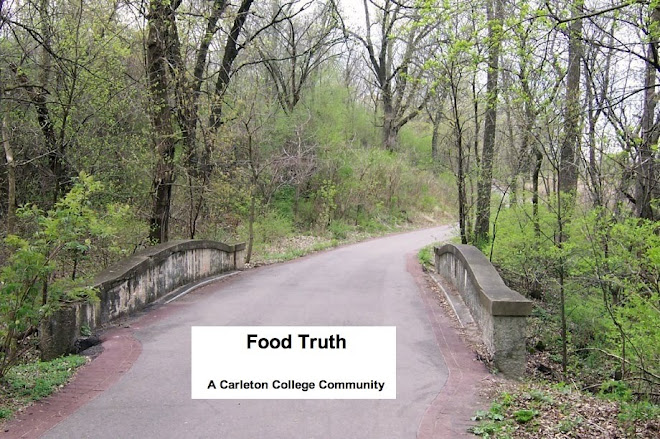Imagine an NGO receiving USDA grant money to construct a community kitchen where farmers drop off produce and families join cooking classes that teach about healthy eating while everyone prepares fresh nutritious meals to bring home…Imagine a community using USDA money to construct an open-sided structure to house a farmers market…Imagine a school using USDA loan money to set up cold storage as part of a larger effort to retrofit the school cafeteria to buy produce directly from farmers and return cooking capacity for school lunch…Imagine…
- The Observer, Sunday 1 February 2009
- Article history
Gaza's 1.5 million people are facing a food crisis as a result of the destruction of great areas of farmland during the Israeli invasion.
According to the World Food Programme, the UN's Food and Agriculture Organisation and Palestinian officials, between 35% and 60% of the agriculture industry has been wrecked by the three-week Israeli attack, which followed two years of economic siege.
Christine van Nieuwenhuyse, the World Food Programme's country director, said: "We are hearing that 60% of the land in the north - where the farming was most intensive - may not be exploitable again. It looks to me like a disaster. It is not just farmland, but poultry as well.
"When we have given a food ration in Gaza, it was never a full ration but to complement the diet. Now it is going to be almost impossible for Gaza to produce the food it needs for the next six to eight months, assuming that the agriculture can be rehabilitated. We will give people a full ration."
The FAO estimates that 13,000 families who depend directly on herding, farming and fishing have suffered significant damage. "Before the blockade and the attack," said Ahmad Sourani, director of the Agricultural Development Association of Gaza, which runs programmes with charities such as Britain's Christian Aid, "Gaza produced half of its own food. Now that has declined by 25%. In addition, a quarter of the population depends on agriculture for income. What we have seen in large areas of farmland is the destruction of all means of life.
"We have seen a creeping process of farmers being forced out of the buffer zone around Gaza's border. Before 2000 we could approach and farm within 50m of the fence. After Israel's evacuation of the settlements in 2005, the Israeli army imposed a buffer of 300m. Although it is elastic, now there are areas, depending on the situation, where farmers cannot reach their farms in safety within an area of over a kilometre. It is indirect confiscation by fear. My fear is that, if it remains, it will become de facto. Bear in mind that 30% of Gaza's most productive land is within that buffer zone."
The wholesale destruction of farms, greenhouses, dairy parlours, livestock, chicken coops and orchards has damaged food production, which was already hit by the blockade.
Buildings heavily damaged during Israel's Operation Cast Lead included much of its agricultural infrastructure. The Ministry of Agriculture was targeted, the agriculture faculty at al-Azhar university in Beit Hanoun largely destroyed, and the offices of the Palestinian Agricultural Relief Committees in Zaitoun - which provides cheap food for the poor - ransacked and vandalised by soldiers who left abusive graffiti.
Although international and local officials are still gathering figures, they believe that scores, perhaps hundreds, of wells and water sources have been damaged and several hundred greenhouses have been levelled, as well as severe damage inflicted on 60,000-75,000 dunums of Gaza's 175,000 dunums (44,000 acres) of farmable land.
As well as the physical damage done by Israeli bulldozers, bombing and shelling, land has been contaminated by munitions, including white phosphorous, burst sewerage pipes, animal carcasses and even asbestos used in roofing. In many places, the damage is extreme. In Jabal al-Rayas, once a thriving farming community, every building has been knocked down, and even the cattle killed and left to lie rotting in the fields.
In al-Atatra, Ahmad Hassan, 65, the overseer of an orchard that once had hundreds of lemon and orange trees, surveyed an area flattened by bulldozers. "This was the well," he said, showing a pile of bulldozed concrete. "We can clear the ground in two weeks. Then what? The well is gone. The pump has been destroyed. And where will the trees come from to replant the land?"
Van Nieuwenhuyse said: "Already, the price of meat has tripled since the Israeli operation began. What is more worrying is the situation over vegetables. Protein we can help with, but before this there were already deficiencies in the diet. Now they will have to rely on Israel."
It was a view echoed by Hassan Abu Etah, the deputy agriculture minister in Gaza. "It has all been hugely damaged. And it affects all of Gaza, not simply the farmers. We produced some of what we needed. It makes you wonder whether they wanted to change Gaza from production to consumption."
In the heavily damaged village of Khuza'a, near Khan Younis, Salam Najar surveyed the no-go zone that extends from the last houses in the village to the border fence where Israeli farmland begins. "Most of the families here have farmed that side. Now no one feels safe to go there. They have destroyed it all."












